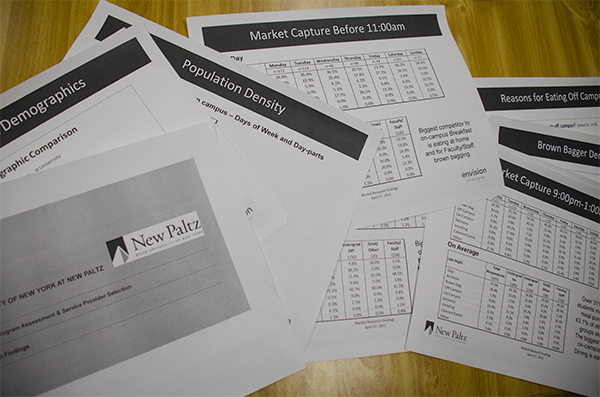
Over the summer, the first draft of a proposal for future desired campus food options was handed to Campus Auxiliary Services (CAS) board for review and discussion. However some student activists are hoping to get more student input into the ensuing drafts.
Last semester, the CAS board voted to hire Envision Strategies to develop a survey that would provide the board with a pulse on student desires for food options on campus, that would later be used to craft a draft of desires and requirements for competing food service providers to adhere to once Sodexo’s current contract runs out in June of 2013.
However, students affiliated with Students With A Common Interest are concerned with the survey’s findings being implemented into future drafts and having more student input on the CAS board.
“The draft that will be finalized will reflect the final contract for food services for the next five-plus years,” Sen. Roberto LoBianco said. “It is essential for students to have input in this process because future generations of students will be effected by this contract.”
In August, Envision Strategies delivered their first draft to CAS Executive Director Steve Deutsch, who called an ad-hoc meeting of the CAS board to discuss the draft and provide feedback to the consultant.
LoBianco, who requested the first draft through the Freedom of Information Law and was denied by college officials, said that he was disappointed with CAS for inviting the ad-officio members of the board – the Student Association President and Residence Hall Student Association President – late and then not allowing him to attend the meeting in lieu of Student Association Vice President Manuel Tejada, when others could not attend.
“It’s a gray area whether [the ad-hoc meeting] must be open given the circumstances that many students couldn’t make the meeting,” LoBianco said. “They should have given more leeway in having the public observe the process.”
However, Deutsch said CAS is not subject to open meeting laws, as they are not officially part of SUNY, but the board has taken extra steps to make the process as “transparent” as possible while still adhering to their guidelines and bylaws. He said draft processes like this are not typically open, but CAS had made “great pains” to ensure input is given from all parties involved.
“It was a working group, not an actual board meeting,” Deutsch said in reference to not allowing LoBianco into the ad-hoc meeting. “It seemed inappropriate to have someone represent someone who was not yet officially on the board.”
Despite this, LoBianco said the student senate is hoping to add two more students to the CAS board before October – which would bring the student representation on the board to the maximum allotment of 50 percent – with hopes of having the most representation possible by the next CAS meeting.
Deutsch said the addition of the two students to the board is possible, but would not be a quick process.
To add student members to the board, who currently represent 40 percent of the CAS board according to Deutsch, would take a few steps to complete. First, an existing member of the board would need to make a motion at their next meeting for more members to be added. Then, the board would vote and discuss the motion.
If approved, CAS’s bylaws would need to be changed and President Christian would need to approve them, Deutsch said.
“It’s possible if the board has the same sense of urgency that the students do,” Deutsch said. “I’m wondering why these students are so passionate and saying they are not being heard – it’s not factual. We say time and time again and demonstrate our transparency. Is it that these students believe they are not being heard or that the entire student body isn’t – that’s what I’m curious about.”
Moving forward, LoBianco said he hopes the two parties can find a common ground and ensure the survey’s findings and student desires are well represented in the ensuing drafts.
“We are looking for language to be added to the draft that specifies the types of food we serve and holds the food service provider accountable,” He said. “They can make these changes and gimmicks, but unless we tell them what we want and set up language that holds them accountable we can’t show what the students want – which is the responsibility of the CAS board.”
Deutsch said the CAS board will continue to be transparent and work toward approving a draft that reflects the interests and desires outlined in the survey.

